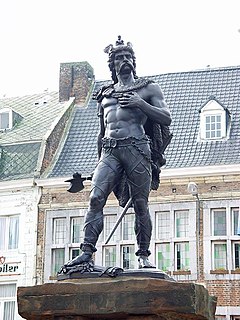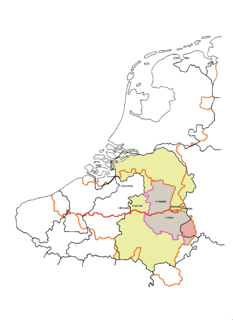
The Germanic peoples, were a category of ethnic groups of continental Northern European origin, identified by Roman-era authors as distinct from neighbouring Celtic peoples. They are also called Teutonic, Suebian, or Gothic peoples in older literature, though the latter two terms are now mainly used to refer to specific groups of Germanic peoples.

Limburg is a province in Belgium. It is the easternmost of the five Dutch-speaking provinces that together form the Region of Flanders, one of the three main political and cultural sub-divisions of modern Belgium.

Tongeren is a city and municipality located in the Belgian province of Limburg, in the southeastern corner of the Flemish region of Belgium. Tongeren is the oldest town in Belgium, as the only Roman administrative capital within the country's borders. As a Roman city, it was inhabited by the Tungri, and known as Atuatuca Tungrorum, it was the administrative centre of the Civitas Tungrorum district. The city is a member of the Most Ancient European Towns Network.

Germania was the Roman term for the historical region in north-central Europe. Its peoples were mostly Germanic, and were referred to by the Romans as Germani.

The Belgae were a large Gallic-Germanic confederation of tribes living in northern Gaul, between the English Channel, the west bank of the Rhine, and northern bank of the river Seine, from at least the third century BC. They were discussed in depth by Julius Caesar in his account of his wars in Gaul. Some peoples in Britain were also called Belgae and O'Rahilly equated them with the Fir Bolg in Ireland. The Belgae gave their name to the Roman province of Gallia Belgica and, much later, to the modern country of Belgium; today "Belgae" is also Latin for "Belgians".

The Tungri were a tribe, or group of tribes, who lived in the Belgic part of Gaul, during the times of the Roman empire. Within the Roman empire, their territory was the Civitas Tungrorum. They were described by Tacitus as being the same people who were first called "Germani" (Germanic), meaning that all other tribes who were later referred to this way, including those in Germania east of the Rhine river were named after them. More specifically, Tacitus was thereby equating the Tungri with the "Germani Cisrhenani" described generations earlier by Julius Caesar. Their name is the source of several place names in Belgium, Germany and the Netherlands, including Tongeren, and several places called Tongerloo, and Tongelre.

The Eburones, were a Gallic-Germanic tribe who lived in the northeast of Gaul, in what is now the southern Netherlands, eastern Belgium, and the German Rhineland, in the period immediately before this region was conquered by Rome. Though living in Gaul, they were also described as being both Belgae, and Germani.

The Condrusi were a Germanic tribe of ancient Belgium, which takes its name from the political and ethnic group known to the Romans as the Belgae. The Condrusi were probably located in the region now known as Condroz, named after them, between Liège and Namur. The terrain is wooded hills on the northeastern edge of the Ardennes.

The Oretani or Oretanii were a pre-Roman ancient Iberian people of the Iberian Peninsula, that lived in today's northeastern Andalusia, in the high Baetis (Guadalquivir) river valley, eastern Marianus Mons, and the southern area of today's La Mancha.

The Toxandri were a people living at the time of the Roman empire. Their territory was called Toxandria, Toxiandria or Taxandria, a name which survived into the Middle Ages. It was roughly equivalent to the modern Campine geographical region of northeastern Flanders and southern Netherlands. In modern terms this covered all or most of North Brabant, the east of Antwerp Province, and the north of Belgian Limburg.
Germani was an exonym used by the ancient Romans for peoples living in the areas north of the Danube and east of the Rhine. The singular form of the name is Germanus. The area inhabited by the Germani was called Germania by the Romans. The peoples called Germani by the Romans were mostly Germanic, although Germania was inhabited by non-Germanic peoples as well. This includes Balts, Celts and Finnic peoples, all of whom were classified as Germani by the Romans. The name Germani is probably of Celtic origin, and was initially applied for one tribe. It does not appear to have been used by the peoples of Germania themselves, although some of them may have designated themselves as "Germani" to distinguish themselves from the Romans. The name survives in the names of Germany and other entities.
The Paemani were a tribe of Belgae in Gallia Belgica, mentioned by Julius Caesar in his commentary of his Gallic Wars. They were one of a group of tribes listed by his local Remi informants as the Germani, along with the Eburones, Condrusi, Caeraesi, and Segni. These tribes are therefore referred to as the "Germani Cisrhenani", to distinguish them from Germani living on the east of the Rhine, outside of the Gaulish and Roman area.

The Germani were an obscure pre-Roman ancient people of the Iberian Peninsula which settled around the 4th century BC in western Oretania, an ancient region corresponding to the south of Ciudad Real and the eastern tip of Badajoz provinces.

For around 450 years, from around 55 BC to around 410 AD, the southern part of the Netherlands was integrated into the Roman Empire. During this time the Romans in the Netherlands had an enormous influence on the lives and culture of the people who lived in the Netherlands at the time and (indirectly) on the generations that followed.

The Caeroesi were a tribe living in Belgic Gaul when Julius Caesar's Roman forces entered the area in 57 BCE. They are known from his account of the Gallic War. They are generally also equated with the Cæracates mentioned briefly by Tacitus in his Histories.
The Segni were a tribe living in Belgic Gaul when Julius Caesar's Roman forces entered the area in 57 BCE. They are known from his account of the Gallic War. They were one of a group of tribes listed by his local informants as the Germani of Belgian Gaul, along with the Eburones, Condrusi, Paemani, and Caeroesi. The Segni do not appear in the first listing of the Germani, which was a listing of Germani sending men to fight Caesar. But they appear in a later mention, after the defeat of the Eburones:
The Segui and Condrusi, of the nation and number of the Germans [Germani], and who are between the Eburones and the Treviri, sent ambassadors to Caesar to entreat that he would not regard them in the number of his enemies, nor consider that the cause of all the Germans on this side the Rhine was one and the same; that they had formed no plans of war, and had sent no auxiliaries to Ambiorix. Caesar, having ascertained this fact by an examination of his prisoners, commanded that if any of the Eburones in their flight had repaired to them, they should be sent back to him; he assures them that if they did that, he will not injure their territories.
The Sunuci was the name of a tribal grouping with a particular territory within the Roman province of Germania Inferior, which later became Germania Secunda. Within this province, they were in the Civitas Agrippinenses, with its capital at Cologne. They are thought to have been a Germanic tribe, speaking a Germanic language, although they may also have had a mixed ancestry. They lived between the Meuse and Rur rivers in Roman imperial times. In modern terms this was probably in the part of Germany near Aachen, Jülich, Eschweiler and Düren, and the neighbouring areas in the southern Netherlands, around Valkenburg, and eastern Belgium, in part of the old Duchy of Limburg. There is a town just over the Belgian border from Aachen called Sinnich, in Voeren, which may owe its name to them. In other words, they lived just north of the modern northern limits of Romance languages derived from Latin.
The Betasii was the name Germanic tribal grouping within the Roman province of Germania Inferior, which later became Germania Secunda. Their exact location is still unknown, although two proposals are, first, that it might be the source of the name of the Belgian village of Geetbets, and second, that it might be further east, nearer to the Sunuci with whom they interacted in the Batavian revolt, and to the Cugerni who lived at Xanten. The area of Gennep, Goch and Geldern has been proposed for example.
The Germani cisrhenani, were a group of tribes who lived west of the Lower Rhine at the time of the Gallic Wars . The name is first mentioned by Julius Caesar, who was writing specifically about tribes near the Meuse river, who had settled among the Belgae before Roman intrusion into the area. Tribes who were certainly considered to be among the original Germani cisrhenani include the Eburones, the Condrusi, the Caeraesi, the Segni and the Paemani, who collectively form a group which apparently later came to be referred to as Tungri, in order to avoid confusion with other "Germani" once, by the time of Tacitus, the term had been extended to include, or more strongly associated with, the vast area of Germania magna beyond the limits of the Roman Empire.

The Civitas Tungrorum was a large Roman administrative district dominating what is today eastern Belgium, and the southern Netherlands. In the early days of the Roman empire it was in the province of Gallia Belgica, but it later joined the neighbouring lower Rhine river border districts, within the province of Germania Inferior. Its capital was Aduatuca Tungrorum, which is modern Tongeren.












